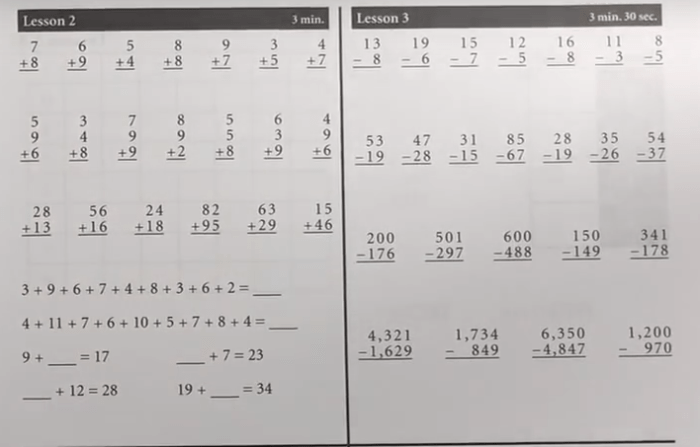Abeka Business Math Test 10 sets the stage for this enthralling narrative, offering readers a glimpse into a story that is rich in detail and brimming with originality from the outset. Embark on a journey through the intricacies of business mathematics, where concepts unfold with clarity and precision.
Delve into the intricacies of test preparation, uncovering effective strategies to conquer the challenges that lie ahead. Discover the secrets to time management, problem-solving prowess, and the art of tackling unfamiliar questions with confidence. Let this guide be your compass, leading you towards a triumphant performance on Abeka Business Math Test 10.
Abeka Business Math Test 10 Overview
The Abeka Business Math Test 10 is a standardized assessment designed to evaluate students’ understanding of business mathematics concepts and their ability to apply these concepts in practical business scenarios.
The test consists of 50 multiple-choice questions, with a time limit of 60 minutes. It covers a wide range of topics, including financial management, data analysis, and business operations.
Test Format
- Number of questions: 50
- Time limit: 60 minutes
- Question types: Multiple-choice
Topics Covered
- Financial management: Budgeting, cash flow, and financial ratios
- Data analysis: Statistics, graphs, and charts
- Business operations: Marketing, sales, and customer service
Preparation Strategies: Abeka Business Math Test 10

To excel on the Abeka Business Math Test 10, effective preparation is key. Here are some strategies to help you succeed:
Begin by thoroughly reviewing your course materials. Make sure you understand the concepts covered in each chapter. If you encounter any difficulties, don’t hesitate to ask your teacher or a tutor for clarification.
Practice Problem-Solving, Abeka business math test 10
Problem-solving is a crucial aspect of the test. To enhance your skills, practice solving problems regularly. Utilize the practice problems provided in your textbook or online resources. Aim to solve a variety of problems to gain exposure to different types and levels of difficulty.
Time Management
Time management is essential during the test. Familiarize yourself with the time limit and allocate your time wisely. Practice taking timed tests to improve your pacing and efficiency.
Identify and Address Weaknesses
Identify areas where you need improvement. Focus on understanding the underlying concepts and practicing problems related to those topics. Seek help from your teacher or a study group to reinforce your understanding.
Test-Taking Techniques

To excel on the Abeka Business Math Test 10, employing effective test-taking strategies is crucial. These techniques empower you to approach different question types with confidence, manage time efficiently, and tackle challenging questions with finesse.
If you’re looking for a comprehensive resource to prepare for the Abeka Business Math Test 10, consider supplementing your studies with the WSET Level 1 Practice Exam . While focused on a different subject, the practice exam offers valuable insights into test-taking strategies, time management, and question formats that can be easily adapted to the Abeka Business Math Test 10.
Question Types and Approaches
The Abeka Business Math Test 10 encompasses various question types, each requiring a distinct approach. Multiple-choice questions demand careful analysis of options, selecting the most appropriate one. True/false questions test your understanding of concepts, requiring you to discern the veracity of statements.
Short-answer questions assess your ability to provide concise, accurate responses. Problem-solving questions challenge your problem-solving skills and demand a step-by-step approach.
Time Management
Time management is paramount during the test. Prioritize questions based on your strengths and allocate time accordingly. Start with questions you can answer quickly and confidently, building momentum and confidence. For more challenging questions, allocate more time but don’t get bogged down.
If you encounter a particularly difficult question, move on and return to it later if time permits.
Challenging Questions
Challenging or unfamiliar questions can arise during the test. Don’t panic; instead, approach them strategically. Reread the question carefully to ensure comprehension. Break down complex questions into smaller, manageable parts. Utilize scratch paper for calculations or diagrams to aid your understanding.
If necessary, eliminate obviously incorrect options in multiple-choice questions to narrow down your choices.
Sample Questions and Solutions
Prepare for the Abeka Business Math Test 10 with these sample questions and detailed solutions, covering key topics and essential concepts.
Sample Question 1
- A company purchases 500 units of a product at a cost of $10 per unit. The company sells 400 units at a price of $15 per unit. What is the company’s profit?
Solution
- Total cost of purchasing 500 units: 500 – $10 = $5,000
- Total revenue from selling 400 units: 400 – $15 = $6,000
- Profit: $6,000 – $5,000 = $1,000
Sample Question 2
- A store sells two types of shirts: Type A and Type B. The store sells 150 Type A shirts at a price of $20 each and 200 Type B shirts at a price of $25 each. The store’s total revenue is $7,500. How many Type B shirts were sold?
Solution
- Total revenue from selling Type A shirts: 150 – $20 = $3,000
- Let x be the number of Type B shirts sold.
- Total revenue from selling Type B shirts: x – $25 = $25x
- Total revenue: $3,000 + $25x = $7,500
- Solving for x: $25x = $7,500 – $3,000 = $4,500
- Number of Type B shirts sold: x = $4,500 / $25 = 180
Sample Question 3
- A company invests $10,000 in a project that has an annual interest rate of 5%. What is the total amount of interest earned after 3 years?
Solution
- Annual interest earned: $10,000 – 0.05 = $500
- Total interest earned after 3 years: $500 – 3 = $1,500
Sample Question 4
- A business has a markup of 25% on its products. If the cost of a product is $50, what is the selling price?
Solution
- Markup amount: $50 – 0.25 = $12.50
- Selling price: $50 + $12.50 = $62.50
Additional Resources
Supplementing your preparation with additional resources can significantly enhance your understanding and test performance. These resources offer diverse materials, including online platforms, textbooks, and practice tests, to cater to different learning styles and preferences.
By utilizing these resources, you can:
- Reinforce your understanding of key concepts.
- Identify areas requiring further attention.
- Simulate the actual test environment.
- Build confidence and reduce test anxiety.
Online Materials
- Khan Academy: Provides comprehensive video tutorials, practice exercises, and personalized learning paths.
- Mathway: Offers step-by-step solutions to math problems, including business-related topics.
- Quizlet: Features flashcards, practice questions, and games to enhance memorization and recall.
Textbooks
- Business Math: A Step-by-Step Approachby Judith Gersting and Richard Cornwall
- Business Mathematics: A Practical Approachby Richard Brown and Tony Jourdan
- Mathematics for Business and Economicsby Jeffrey Slater and Janet Trombley
Practice Tests
- Abeka Test Prep: Offers official practice tests specifically designed for the Abeka Business Math Test 10.
- Varsity Tutors: Provides online practice tests with detailed answer explanations.
- Test Prep Review: Features a comprehensive library of practice tests and study materials.
Helpful Answers
What is the purpose of Abeka Business Math Test 10?
Abeka Business Math Test 10 is designed to assess students’ understanding of fundamental business mathematics concepts, preparing them for success in higher-level courses and the workplace.
How can I effectively prepare for Abeka Business Math Test 10?
Effective preparation involves reviewing course materials, practicing problem-solving, and identifying areas of weakness. Utilize the strategies Artikeld in this guide to maximize your preparation efforts.
What types of questions can I expect on Abeka Business Math Test 10?
The test covers a wide range of business mathematics topics, including financial calculations, data analysis, and problem-solving. Sample questions and solutions are provided within this guide for your reference.